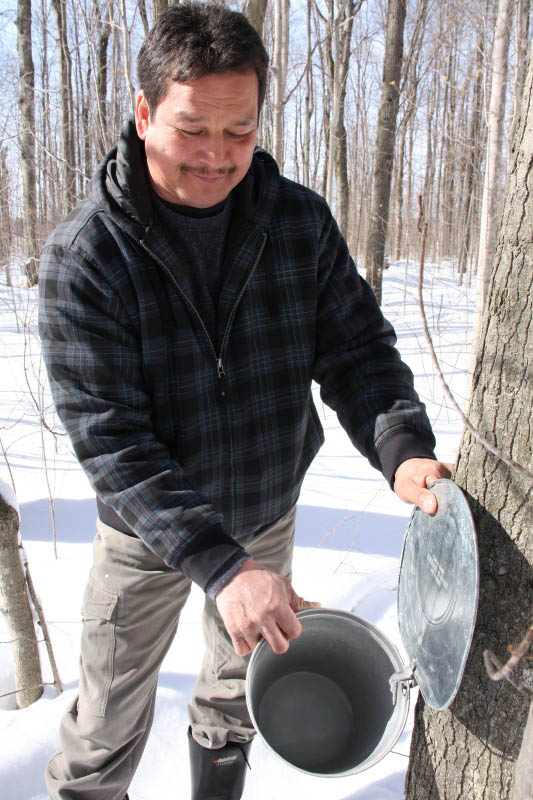A sweet business on Christian Island

By Sharon Weatherall
BEAUSOLEIL FN –Ted Marsden went back to his roots when he started producing maple sugar this year. The Christian Island man is tapping trees on the same land as his grandparents did almost a century ago.
“My grandmother used to supply the island, about 500-600 people. I learned how to make maple syrup from my father Earl Marsden – he started 35 years ago,” says Ted, who purchased a 28-acre sugar bush from a cousin in order to keep the land in his family.
“I have 250 trees tapped on two acres of the land and next year I hope to expand to 400 or 500 trees.”
A carpenter by trade, Marsden comes from a family with farming history. He wants to use the land to produce food, tying in his maple syrup operation with the production of garden vegetables. His grandparents once owned about 200 acres on Christian Island, including a 50-acre sugar bush and fields for farming potatoes, wheat and animals. Last summer Ted and wife Jane cleared an area beside their sugar bush and planted vegetables. They found the land to be very fertile, experiencing ample growth within a couple of weeks. Most of the harvest was given to community members, who thanked the Marsdens by bringing back preserves.
In the coming season their “JTL Organic Garden” will offer a pick-to-order option where people can pick their own vegetables and there will be less waste. The business will be family operated by the Marsdens and sons TJ and Lance.
“We hope to sell our produce to tourists and people on the island,” says Ted, who will also sell his own maple syrup at the vegetable stand.
Marsden has built a sugar shack with an evaporator where he boils the clear coloured sap or “Sweetwater” to temperatures of 230 degrees Fahrenheit to produce different grades of maple syrup; the darker the colour the sweeter the taste. Maple syrup taffy is made by boiling the syrup to a very hot 250 degrees.
The buckets of sap are filtered into barrels before going into the evaporator and again when it comes out of the finishing stage as sticky thick syrup. The evaporator has three compartments to boil the sap at three different temperatures for six hours before it is ready.
“I think it will be a longer season this year because of all the snow and cold weather. Right now with each boil we are getting about one litre of maple syrup,” says Ted.
“Next year I will be doing some boiling outside using three kettles over a fire — that’s the old way my dad used to make it.”
Christian Island Elementary School students have been invited to the sugar bush this year to learn about the production of maple syrup, both modern-day and methods used in the past. Marsden and his son TJ explain how native people of long ago made maple syrup by bringing it to boil with red hot stones in hollowed-out logs.
“I think it is a great idea for the kids to come and see how the process is done and I hope to open it up to visitors as well,” says Ted.
“Making maple syrup has been done by native people for hundreds of years. It makes me proud to be able to carry on with this tradition.”


